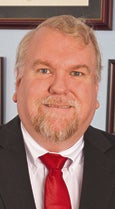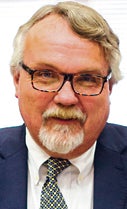Local bar association hosts superior court judge candidate forum
Published 10:15 am Monday, April 18, 2016
By BETH ALSTON
beth.alston@americustimesrecorder.com
www.americustimesrecorder.com
AMERICUS — The Southwestern Judicial Circuit Bar Association (SJCBA) hosted one of three public forums for candidates for the seat of Superior Court judge to be vacated at the end of the year as Judge George Peagler retires. The forum was held April 7 at the Sumter County Courthouse in one of the courtrooms.
Justin Arnold, vice president of the (SJCBA), served as moderator. The public was asked to submit questions to be answered by the three candidates: Jimmie Brown of Lee County, Kevin Kwashnak of Americus, and Lewis Lamb of Lee County.
The format was set up so that each candidate had the opportunity to deliver an individual speech, followed by a Q&A.
After drawing numbers to determine order, Jimmie Brown was up first.
Brown said he grew up in the Cussetta area, and joined the U.S. Army at age 17, working up to the rank of sergeant in the 82nd Airborne. When he got out, he came to Americus to attend Georgia Southwestern College on the GI Bill and “crammed a four-degree into two and a half years,” graduating magna. He went on to Mercer University law school and since then has practiced law for nearly 33 years.
Brown said he practices across the state from his office in Albany, working with families, individuals, small businesses and law enforcement officers. He stated that about a quarter of his practice comes from workers’ compensation cases.
“During the first 20 years or so of my practice, I handled criminal cases, domestic cases, civil cases, from misdemeanors to homicides. I’ve been involved in complex litigation, three class action suits … ”
Brown said he’s a frequent speaker at seminars.
His greatest revenue generator, he said, was “during the last 15 years or so, our focus has been on civil cases, and … a lot of 18-wheeler litigation. I’ve mentored young lawyers. We were the first white law firm in Albany to hire a black lawyer. I hired a black law clerk, Willie Weaver, and later hired him when he graduated from law school and mentored him … He went on and has been a Municipal Court judge in Albany for over 10 years.”
Brown said he’s been active in public service organizations, on the Albany Law Library board for a number of years, on the Lee County Indigent Defense board, and active in veterans organizations. He and his wife are also active in their church where he served as past deacon chairman. He currently teaches a Sunday school class and chairs the finance committee. He also formerly served as chairman of the Lee County Republican Party.
“This is a nonpartisan seat we’re running for here and I’m asking for Democrat and Republican support … I do think the judges shouldn’t have a partisan view … I think some of the other positions should be nonpartisan,” he said.
He and his wife have been married for 28 years, and have four grown children between them.
“I think that in addition to being professional and experienced, that judges should be absolutely fair to everyone,” he said, adding that character and integrity are essential to the job. “If you will have me, I want to be a positive judicial leader and servant.”
Kevin Kwashnak spoke next.
He said when he learned that Judge Peagler planned to retire, he gave it a great deal of thought and decided to run, finding that he had a good deal of support.
He said some people asked him why they should vote for him, and he responded to them immediately, giving them his resume.
Kwashnak came to Americus as the law clerk for the circuit judges at that time: Rucker Smith, Peagler, and the late John Harper, handling all the legal matters for the judges such as research.
“I believe that’s helped me,” he said, “giving me an inside observation of what the judges do and how the court system runs.”
For the past 11 years, Kwashnak has worked for the circuit’s Public Defender’s Office, handling “cases ranging from traffic offenses all the way up to murder charges.”
Kwashnak then laid out three issues that he has seen in the circuit that he believes he can address as a judge:
• Professionalism. “I’m a big believer in professionalism,” he said. He has volunteered for the past eight years with the Chief Justice Committee on Professionalism, speaking at law schools, including his alma mater, Mercer University. He said he’s seen attorneys show up in court who aren’t prepared for trial or for cases and even some have shown up in court not knowing what they would be doing that day. “I believe that is a big issue in the circuit,” he said. “My job, as a judge, would be to make sure the attorneys are kept accountable and are moved forward.”
• Cookie-cutter sentencing from the criminal side. “Not everybody should get the same sentence … As a judge, it would partially be my job to make sure that the sentencing is appropriate to the individual. … I believe that [sentencing] needs to reviewed and better handled.”
• Justice should not be dictated by cost. “Judges should not be dictated by how much it costs to sentence somebody in a certain way. I believe that justice requires doing what’s right and having done what’s right. [Cost is] something to be looked at, but not a factor to be used in determining a sentence. Not what’s quickest but what’s right. Those are the three issues I see in the circuit and I would address them.”
Lewis Lamb was up next.
Lamb, the circuit’s chief assistant district attorney (ADA), offered his appreciation for the SJCBA for hosting the event, for the sheriff’s personnel for keeping the courthouse open and the audience members who showed up to hear what the candidates had to say.
Lamb has served as ADA for more than seven years. Prior to that, he worked for the Public Defender’s Office. For about 15 years prior to that he was in private practice, mostly in South Georgia.
“I have … a breadth of experience that really can’t be matched by any other candidate,” he said. “I’ve not only tried civil cases to juries, I’ve tried divorce cases, personal injury cases. I tried a land line case and there are not that many lawyers old enough to say they had a jury trial over a land line in this state.”
In addition, Lamb has represented people who were charged with crimes, both in private practice and with the Public Defender’s Office, and now as a prosecutor with the D.A.’s office.
“So I’ve been at this table in the courtroom and at that table in the courtroom and I’ve advocated for people who’ve been charged with crimes and I’ve advocated for victims of crimes,” he said.
“The other essential bit of experience that I have is making decisions that are very tough decisions,” he said, “that have to be made fairly and with intellectual honesty, with integrity and, most importantly of all, that have to be made by someone.
“As prosecutor it’s my job to determine whether or not to prosecute a particular case and, if so, how to prosecute it; whether to charge it as a felony or a misdemeanor … and ultimately if there is a plea in the case or a jury verdict … it’s my job to make a recommendation to the court as to what an appropriate sentence will be. You’ve seen me in court; you’ve seen me make those recommendations and I think I have established a positive track record for being fair to people on both sides of the case … because everyone who walks into a courtroom and stands here and looks at that bench and looks at the judge is in entitled to be treated fairly, and with respect.”
Lamb said he has done that as a prosecutor and people can draw on that experience and observation “to determine what kind of person I would be that you chose to be sitting in that chair.”
Of sentencing recommendations, Lamb said, … there’s such a huge variety and options available now. There are alternative sentencing options, pre-trial diversion programs and drug court programs, and I’m proud to say that in Lee County where I handle most of the criminal cases … I was a big part in helping to develop the pre-trial programs and the drug court programs that are used there now. And those programs give people, especially young people, who’ve been charged with a crime for the first time in their life an opportunity to do something other than to be stuck with a criminal history. It gives them an opportunity to go on with their education or their jobs.”
Lamb said that a lot of people from this area work at the Marine Corps Logistics Base in Albany. “Say you are charged with a crime and you lose your security clearance, now people are out of a job and their families have lost their breadwinner … Those alternative sentencing programs keep people in a position where they don’t lose their jobs over a mistake, over something they shouldn’t have done and admittedly shouldn’t have done. It keeps them where they can get an education, go to work, and not have to fight those kinds of battles in having a criminal history.
“Beyond that, when you get to more serious crimes, there are first offender, alternative-sentencing programs, detention centers, diversion centers, treatment facilities for people who have alcohol or substance abuse problems, cross-treatment facilities for people who have mental health problems, etc., and as a judge you have to know what all of those options are” and be able to make decisions about which individuals are candidates for which programs.
“I have that kind of experience,” he said. “ … the most important thing for a judge to do is to be respectful, to be fair, to have integrity, to be honest with folks …
Lamb said his father was a minister and had a plaque hanging in their home bearing a biblical quote from Micah which defines what God requires of a man.
“I think it’s the same things that citizens should require of a judge,” he said, “the quote said ‘do justly; love mercy, and walk humbly.’
“I try to do that as a prosecutor and I’ll try to do that as a judge,” he concluded.
Coming next week: questions from the public and answers from the candidates.








